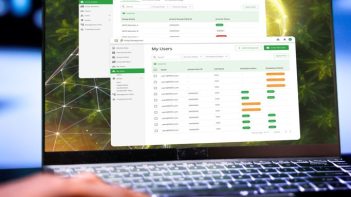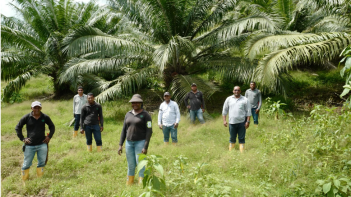In a landmark agreement, RSPO and Indonesia’s Laweyan Batik Village Development Forum (FPKBL) have joined forces to advance and promote batik products using sustainable palm oil. Photo: RSPO.
Jakarta, Indonesia, 2 October 2022: On Indonesia’s National Batik Day, marking the anniversary of UNESCO’s recognition of Indonesian batik as an Intangible Cultural Heritage of Humanity in 2009, the Roundtable on Sustainable Palm Oil (RSPO) and the Laweyan Batik Village Development Forum (FPKBL) have joined forces, signing a Memorandum of Understanding (MoU) to establish their mutual intention to collaborate in advancing and promoting batik products that use sustainable palm oil raw materials in Indonesia.
Under the cooperation agreement, FPKBL will work together with RSPO to encourage systemic changes in its production processes, with the aim to shape a batik industry which is built on sustainable practices.
This goal will be anchored in a four-fold approach: FPKBL membership of RSPO; capacity building and awareness of FPKBL members about sustainable palm oil; use of RSPO certified sustainable palm oil and its derivatives (including but not limited to palm oil-based wax); and marketing of FPKBL batik products centred on the use of certified sustainable palm oil in the production process.
At the MoU signing, Mahatma Windrawan Inantha, RSPO Deputy Director Market Transformation, Indonesia, said “I welcome this collaboration agreement between RSPO and the Laweyan Batik Village Development Forum as it signals not only a closer alignment between two formidable industries driving Indonesia’s economic growth but also a transformative moment leading the country’s iconic batik industry towards the path of sustainability.”
“The ancient art of batik is inseparable from Indonesia’s cultural identity,” added FPKBL Chairman, Alpha Febela Priyatmono. “We find ourselves in an opportune moment to steer this industry whose origins date back to 5000 BC to face the sustainability challenges of our world today. Our closer cooperation with RSPO is a step in the right direction by upholding our commitment to use RSPO certified sustainable palm oil in our production processes.”
The Kampoeng Batik Laweyan Development Forum (FPKBL) is an organisation that manages the Kampoeng Batik Laweyan cluster located in Central Java, where local people share a common enterprise as batik producers. FPKBL aims to be a pioneer in guiding the batik industry in creating a balance between meeting market needs, social and economic justice, and environmental sustainability.
Sustainable palm oil-based wax in batik
In Indonesia, the use of palm oil-based wax in batik products was introduced in 2021 as the result of research by the Indonesian Palm Oil Association (GAPKI) in collaboration with the National Research and Innovation Agency (BRIN). The stearin that is used as batik wax can produce a sharper and brighter colouring.
As part of the collaboration between FPKBL and RSPO, a comprehensive programme will be implemented to accelerate systemic sustainable palm oil practices, namely, increasing the uptake of sustainable palm oil products in the domestic market.
Looking towards the future, this shift to sustainable palm oil is envisioned to deliver positive impacts on FPKBL’s development, as a leading batik industry player and a sustainability benchmark that recognises and prioritises environmental sustainability in its business practices.
About RSPO:
The Roundtable on Sustainable Palm Oil (RSPO) was formed in 2004 with the objective of promoting the growth and use of sustainable oil palm products through credible global standards and engagement of stakeholders. RSPO is a not-for-profit, international, membership organisation that unites stakeholders from the different sectors of the palm oil industry including oil palm producers, palm oil processors or traders, consumer goods manufacturers, retailers, banks, and investors, environmental or nature conservation NGOs, and social or developmental NGOs.
This multi-stakeholder representation is mirrored in the governance structure of RSPO such that seats in the Board of Governors, Steering Committees and Working Groups are fairly allocated to each sector. In this way, RSPO lives out the philosophy of the “roundtable” by giving equal rights to each stakeholder group, facilitating traditionally adversarial stakeholders in working together to reach decisions by consensus, and achieving RSPO’s shared vision of making sustainable palm oil the norm.
The seat of the association is in Zurich, Switzerland, while the secretariat is currently based in Kuala Lumpur with satellite offices in Jakarta, London, Zoetermeer, Beijing, Bogotá and New York.
About FPKBL:
The Kampoeng Batik Laweyan Development Forum (FPKBL) is an organisation that manages the Kampoeng Batik Laweyan cluster which was established on September 25, 2004. Kampoeng Batik Laweyan is the name of a tourism, cultural heritage and batik industry cluster located in the Laweyan area, Surakarta city, Central Java. The Kampoeng Batik Laweyan cluster is an area where the local people have the same type of business, group and hereditary, namely as batik producers. FPKBL has a vision to become a center for the batik industry and cultural heritage developed with the concept of tourism through environmentally friendly and sustainable development. Its uniqueness and long history of Kampoeng Batik Laweyan has made it designated as one of the National Vital Objects by the Ministry of Tourism of the Republic of Indonesia in 2016.
For further information, kindly contact:
| RSPO Communications Team | Mahatma Windrawan InanthaRSPO Deputy Director Market Transformation, Indonesia
T: +628111717989, +62-21-2506417 |
Keep reading

Access into prisma

Updated Trace Function in prisma

Call for Expression of Interest: Independent Investigation of a Complaint

Latin American Smallholders, Key Global Brands Gather in Peruvian Amazon to Advance Sustainable Palm Oil

RSPO Forum for Members and Certification Bodies 2025: Strengthening Capacities and Building Bridges with RSPO Members

From Violence to Prosperity: Cultivating Sustainable Palm Oil in San Pablo, Colombia

Palmas de Tumaco: Enduring, Trusting, and Transforming in Colombia’s Pacific Coast
Carry Over Credits for Certified Independent Smallholder Groups




